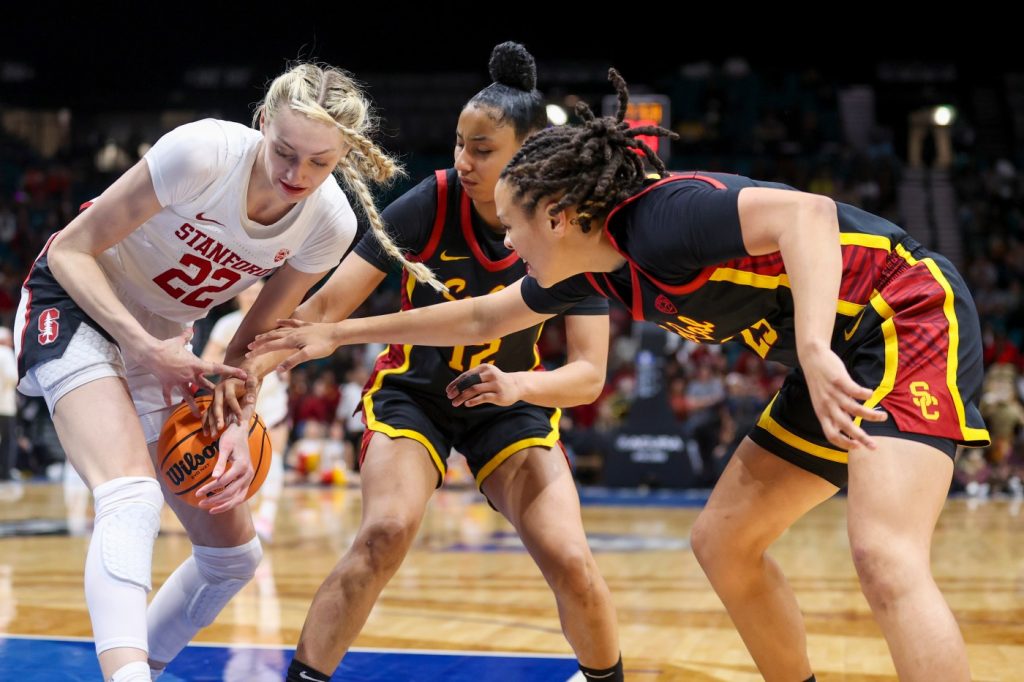LAS VEGAS – JuJu Watkins sped off late Friday night, navigating through MGM Grand on an electric scooter to keep weight off her sprained ankle, family and friends trailing behind with their phone cameras in full chronicle.
It wasn’t Caitlyn Clark-level surreal, but the scene was symbolic of how Watkins, with more points as a freshman than Clark scored in 2020-21, is on her way to the superstardom Clark has achieved as the NCAA’s career scoring leader.
For now, the casino caravan was a reminder of the bullet USC dodged when Watkins’ ankle injury early in overtime against UCLA proved not to be anywhere near as serious as it first appeared.
She returned to complete her 13th game with at least 30 points in the Trojans’ 80-70 double overtime win, setting up a dream Pac-12 tournament final against top-seeded Stanford. Not even that match-up, though, would have withstood the letdown for the Pac-12 in its final season had Watkins been seriously hurt.
“Even when I went out, I knew I had to get back in because I think my team needed me,” Watkins said. “But it’s just an ankle. Nothing I’m not used to.”
USC coach Lindsay Gottlieb recalled something similar with nothing at stake during an early-morning workout she watched when Watkins was in high school. “She rolls her ankle and could have sat out,” but returned. “This kid is not normal. So I can’t say I was surprised (Friday).”
A bigger surprise came before the semifinal at MGM Grand Garden Arena, when Watkins gifted her teammates, coaches and support staff with new shoes “just to show gratitude,” Gottlieb said. “She’s just different. That’s why the team has her back so much.”
Growing up in the Watts section of Los Angeles, Watkins chose to stay home for college, echoing her great grandfather Ted Watkins, whose motto as founder of the Watts Labor Community Action Committee in 1965 was “Don’t Move, Improve.”
“There’s always a bigger picture outside of basketball and what else I want to do,” Watkins said. “I don’t feel like I’ve really tapped into that yet. There’s always more to do, always ways to improve as a person and a player. That mentality keeps me grounded.”
Watkins is favorite for National Freshman of the Year after being a landslide winner of Pac-12 Freshman of the Year and the only freshman on the 15-player all-conference team. She averages 27 points per game, second nationally behind Clark.
“I’ve put in the work,” the 6-foot-2 guard said. “Put in the work, get the results. As long as we’re winning, I’m cool. As long as we handle what we’re supposed to handle in the tournament and for the rest of the season, that’s all that matters to me.”
Trojans show mojo beyond JuJu
Because of Watkins dropping a season-high 51 points on Stanford in the teams’ only regular-season meeting — 67-58 USC win on Feb. 2 — the Cardinal devised an anyone-but-JuJu game plan for the rematch.
Elena Bosgana primarily guarded Watkins, with everyone else seemingly on call to help on any possession. It was a “weird defense,” Pac-12 Player of the Year Cameron Brink said, that worked in winning the battle against Watkins but not the war.
Watkins scored her only two points of the first half on free throws with 1:36 left, didn’t make a field goal until 4:39 of the third quarter and finished with a season-low nine points on 2-of-15 shooting. But her teammates proved ready, leading almost the entire game for a 74-61 win and USC’s first Pac-12 tournament title since 2014.
McKenzie Forbes, one of three Ivy League transfers starting for USC, was 11-of-21 from the field for 26 points and named the tournament’s Most Outstanding Player. Teammate Rayah Marshall had a 10-point, 18-rebound double-double. The Trojans had a 48-28 rebounding advantage and 21-6 edge in points off turnovers.
“We’re in Vegas, anything is possible,” Marshall said after a lengthy post-game celebration. “A guy said, ‘You just won me $10,000.’ I said, ‘fight on.’ Just the magic of being competitive and wanting to win. And we did just that.”
Gottlieb said she expects Watkins to be sore after playing 38 minutes on her ankle against stifling defense that forced her into six turnovers. But the NCAA Tournament doesn’t begin until March 22 or 23, so there is time to recover and soak in the Trojans’ improvement from 12-16 in Gottlieb’s first season (2022) to 26-5 and a possible No. 1 seed.
“I’m not sure we win this game two months ago,” Gottlieb said. “They tried to completely take her (Watkins) away and Raya’s making plays 1-on-1 and Kenzie and (Kayla) Padilla are hitting shots.
“That’s what we are at our best. I credit all of them for really believing in that from the beginning. And we needed it today. We don’t win a championship without being able to rely on everything that is truly our team.”
Stanford fell short of sweeping the Pac-12 regular season and tournament titles for a 13th time and showed front-court vulnerability that needs attention before NCAA play begins.
“We have to execute offensively better,” Stanford coach Tara VanDerveer said. “We didn’t always get the shots we wanted. More than anything, we have to rebound better.
“Our team, because we depend so heavily on Cam and Kiki (Iriafen), is not a three-game-in-four-day team, but more of a two-game in three days. So I think we’re in great position for the NCAA (format). The most important thing is our team being healthy and people really wanting to play with each other.”
Lots of chalk
Unlike 2023, when the Pac-12 tournament had a record seven upsets (based on seeds), leading to a title for No. 7 Washington State, there were no such upsets until the final, when No. 2 USC prevailed over Stanford.
No. 10 Washington came closest in the first round Wednesday, losing 58-50 to No. 7 Arizona. The Wildcats then scared USC for the second time in eight days, losing 65-62 in the quarterfinals.
No. 4 Oregon State needed double overtime to subdue No. 5 Colorado (in the quarterfinals) in what might have been the best game of the tournament had USC and UCLA not gone into double overtime in their rivalry rubber match.
Oregon State led by 16 points midway through the second quarter against Stanford on Friday only to be outscored 39-22 in the second half. USC also was up by 16 points on UCLA at the end of the first quarter before the Bruins won the next three quarters to force overtime.
“If you’re a competitor at this level and all these teams are in the top 10, that we’re battling, it’s rare that someone’s just going to lay down,” UCLA coach Cori Close said. “You’re just not going to have a group that’s not going to compete to scratch and claw and come back. The teams are too good.”
Good enough that coaches are adamant that more than the six ranked Pac-12 teams should make the 68-team NCAA Tournament field, which will be announced March 17. Arizona has the strongest case of the unranked teams based largely on its play since Feb. 16 — and with its No. 34 ranking in the NET.
Washington State’s NET still is a lofty No. 29, but the Cougars are 3-8 since losing star guard Charlisse Leger-Waker to a season-ending knee injury and on the bubble for a fourth straight NCAA appearance. The Cougars, California and Washington seem more likely to be headed for the 48-team WNIT.
“What you’ve seen is that we have three (worthy) No. 1 seeds in this conference, point blank,” Close said of her Bruins, Stanford and USC. “Everyone’s talking about maybe six (total), give me a break. That’s just to me so short sighted with this conference.
“If you’re going to say we’re the best conference in the country, you can’t cut those people off that are in that conference and you’re beating each other up.”
Stanford, USC, UCLA and Oregon State are projected as hosts for the opening weekend of NCAA play with Colorado hovering near the cutoff (No. 4 seed) to host. Utah, which lost to UCLA in the tournament’s quarterfinals, also will make the NCAA field in the No. 5-6 seed range.
Something special gets away
While compartmentalizing was the operative word for Pac-12 coaches in their final group get-together before the conference splits four ways, a reflective, almost melancholy mood, could not be avoided given what is being lost in women’s basketball.
“It’s really sad that we let something so special go away,” said Cal coach Charmin Smith, whose association with the Pac-12 goes back to her playing days at Stanford (1994-97).
Gottlieb coached at Cal from 2012-19 (and reached the NCAA Final Four in 2013) before returning to the Pac-12 at USC.
“The conference has just been an unbelievable platform for female athletes,” she said. “Really special conference in terms of the values and what these schools represent. There’s obviously just some sadness in terms of this being the last one at the same time a lot of pride in us winning the last one.”
It’s naturally VanDerveer, the winningest coach in college basketball history, who is most impacted by the breakup because of her role in making the Pac-12 about more than Stanford.
Since 2013, six Pac-12 schools have reached the Final Four, with the Cardinal and Arizona meeting for the title in 2021.
“I’m absolutely heartbroken about what has happened to our great conference, especially where we’ve come from nowhere to where we are with women’s basketball,” VanDerveer said. “I can only hope that going forward we’ll figure something where we come back to play with Oregon State, all the teams that are kind of sister schools on the west coast.”
Related Articles
Pac-12 MBB: Kyle Smith, Caleb Love lead our postseason honor roll
Pac-12 power ratings: Arizona’s tricky path to a No. 1 seed in NCAAs
Mailbag: The ongoing issues with Pac-12 MBB, Kliavkoff’s failures, future CFP access, ASU’s AD job and more
Time for a coaching change as Jerod Haase’s program flounders, say all-time Cardinal greats
Best of the West: Arizona on top, Gonzaga climbs and Utah State’s remarkable rise
That won’t be the case starting in the 2024-25 when USC, UCLA, Oregon and Washington move to the Big Ten; Colorado, Utah, Arizona and Arizona State head to the Big 12; Stanford and Cal move to the ACC; and Oregon State and Washington State become affiliate members of the West Coast Conference (for sports other than football).
Reviving the Pac-12 likely will require a merger with the Mountain West or football creating its own organizational structure separate from other sports.
VanDerveer (coaches) and Oregon State’s Scott Rueck (media) were voted Pac-12 Coaches of the Year in a fitting split decision.
Rueck recalled his first introduction to VanDerveer on a recruiting trip to Chicago after coming to Oregon State in 2010 from Division III George Fox.
“She welcomed me and just anything I need, let her know. And that set a tone that has maintained,” Rueck said. “This conference has had so many amazing coaches. They are rivals, but I see them as colleagues. There’s just massive respect throughout, and it’s always been the case.
“That part of it has been a great joy for me because you know you’re competing against just incredible people and incredible coaches that pour their lives into this. It’s just a massive blessing to be a part of.”
*** Send suggestions, comments and tips (confidentiality guaranteed) to [email protected] or call 408-920-5716
*** Follow Metcalfe on Twitter/X: @jeffmetcalfe
*** Follow Jon Wilner on Twitter/X: @WilnerHotline
*** Pac-12 Hotline is not endorsed or sponsored by the Pac-12 Conference, and the views expressed herein do not necessarily reflect the views of the Conference.


